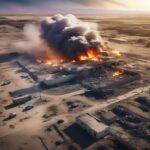Recent airstrikes conducted by the United States in Iraq and Syria on February 2 have sparked discussions about the escalating tensions in the Middle East. The U.S. Central Command reported that the strikes targeted Iran’s Islamic Revolutionary Guards Corps (IRGC) Quds Force and affiliated militia groups. The operation involved U.S. aircraft, including long-range bombers flown from stateside bases, hitting over 85 targets. These included command-and-control operations centers, intelligence centers, rockets, missiles, unmanned aerial vehicle storages, and logistics and munition supply chain facilities.
Background and Context
The airstrikes came shortly after a drone attack on a base in Jordan resulted in the death of three U.S. soldiers. Although the strikes stopped short of directly targeting Iran, President Joe Biden issued a statement warning that military responses would continue “at times and places of our choosing.”
Analysis by Retired Air Force Major General
Retired Air Force Major General Mick McGuire shared his insights on the recent military developments, expressing disappointment that the situation had reached this point. McGuire, not surprised by the military response, highlighted the mourning for the lost servicemen and the injured Arizona guardsmen in Jordan. He expressed hope that these actions would act as a deterrent, reducing the frequency and level of violence experienced by U.S. servicemembers overseas.
Concerns About Protracted Engagements
Major General McGuire raised concerns about the cycle of violence, stating that protracted engagements without clearly defined military objectives could lead to extended conflicts. He emphasized the need for a defined purpose to avoid getting bogged down in ongoing military operations. McGuire suggested that instructing military personnel to strike a few targets intermittently may not provide a sustainable solution and could perpetuate the cycle of violence.
U.S. Right to Defend Itself
According to McGuire, any time the U.S. responds with military force, it is appropriate, asserting the country’s right to defend itself. He acknowledged the capabilities of the U.S. military but cautioned against prolonged engagements without clear objectives.
Statistics and Impact
While specific statistics about the airstrikes and their impact are not provided, the mention of over 85 targets indicates the scale of the operation. The recent loss of three U.S. soldiers in the drone attack underscores the human cost of the escalating tensions in the region.
Addressing Ongoing Challenges
The recent military actions in the Middle East have once again raised concerns about the potential for protracted engagements and the need for clearly defined objectives. Major General McGuire’s insights highlight the importance of addressing ongoing challenges and finding sustainable solutions to avoid prolonged conflicts in the region. The situation remains dynamic, and further developments will require careful monitoring.









Leave a Reply